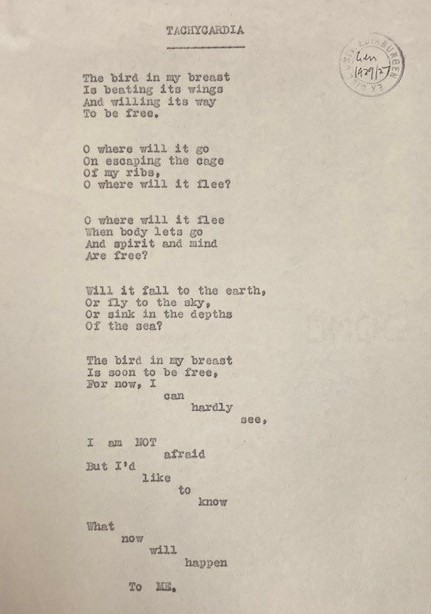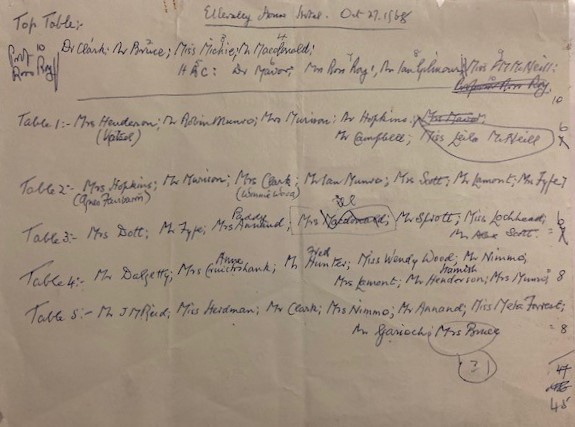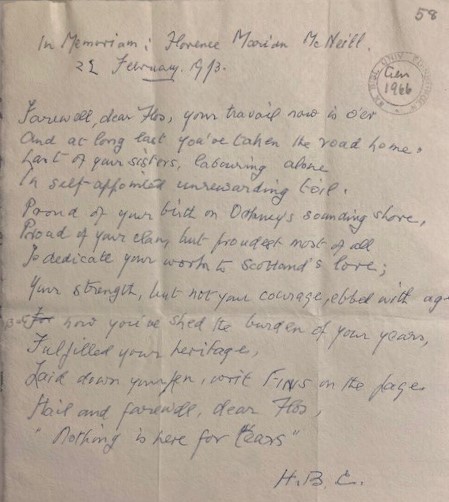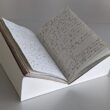Home University of Edinburgh Library Essentials
July 27, 2024
‘Nothing is Here for Tears’: Helen Cruickshank Bids Farewell to F. Marian McNeill
Posted on February 22, 2023 | in Archives, Library & University Collections, Scottish Literary Collections | by pbarnabyThis year marks the fiftieth anniversary of the death of folklorist F. Marian McNeill on 22 February 1973. Edinburgh University Library holds the manuscript of a memorial poem written by her close friend Helen Cruickshank on the day of McNeill’s death. Today we publish a blog by Ash Mowat, a volunteer in the Civic Engagement Team, introducing our Helen Cruickshank Papers (Coll-81) and celebrating the friendship between Cruickshank and McNeill (with additional material from Modern Literary Collections Curator Paul Barnaby).
Helen Cruickshank
Helen Burness Cruickshank was born in 1886 in a village near Montrose, Angus. She did not come from an affluent family and was therefore unable to afford to attend university, although she was awarded an honorary MA from the University of Edinburgh in 1970. She began writing poetry after moving to Edinburgh in 1912, with her first pieces published in magazines and newspapers. Her first poetry collection Up the Noran Water, however, did not appear until 1934, when she was in her forties. It was followed by two further volumes Sea Buckthorn (1954) and The Ponnage Pool (1968) and by a Collected Poems published in 1971. An unfinished autobiography Octobiography was published after her death in 1976. She was a founding member of Scottish P.E.N. (1927) and of the Saltire Society (1936). She was also active in politics as a suffragette, union member, and Scottish nationalist.
Unlike more privileged literary contemporaries, Cruickshank had a demanding (and fulfilling) day job as a senior civil servant in the Scottish Department of Health, until health problems forced her to take early retirement in 1944. She was also tasked with caring for her mother following the death of her father in 1924 which placed further constraints on her writing opportunities.
She was renowned for offering generous hospitality and artistic support at her home in Corstorphine, Edinburgh, welcoming friends and contemporaries such as George Mackay Brown, Hugh MacDiarmid, and others. She continued to write and publish into her eighties, and died whilst resident in Edinburgh’s Canongate in 1976, aged 88.
Cruickshank the Poet
Her poems were written in Scots, or English, or sometimes a combination of the two. In a poem ‘Homespun’, the male narrator is walking the streets of London when the sight of a man wearing Harris Tweed conjures up the sights, sounds, and smells of his beloved Scotland: ‘the breath of hill and sea and bog’. He continues: ‘I saw the crofter bait his line, / The children herding yellow kine, […] with buoyant step I went along, / Whistling a Hebridean song’. It is a charming piece that transports the reader out of city streets and immerses them in the beautiful and rugged Scottish island landscape.
Edinburgh University Library’s Helen Cruickshank Papers (Coll-81) include working materials for all of her published volumes of poetry, along with manuscripts of Octobiography and of individual poems, short stories, plays, essays, and public talks. One of the most extraordinary manuscripts is for the late poem ‘Tachycardia’ (Gen. 1929/27), in which Cruickshank experiments with the visual effects of concrete poetry. Her autobiography and the talk ‘Some Trends in the Development of Modern Poetry’ (Gen. 1929/26) show, in fact, a lively and unusual interest for the concrete verse of Ian Hamilton Finlay and Edwin Morgan, which met with such a hostile reception from other poets associated with the Scottish Literary Renaissance.

In this poem, tachycardia, the medical term for an accelerated heartbeat (a condition from which Cruickshank increasingly suffered in her later years) is so directly represented that it affects the structure of the poem, as its lines themselves become derailed from their stanzas through the sheer energy of the writing. The poem brilliantly captures the contradictions of the bird (a cipher for the poet’s heart) and nature’s freedoms, spirits, vulnerabilities and perils of capture and death. There is a recurring rhyme at the end of each stanza, and the rhythms and cadences of the text evoke the fragile beauty of the creature.
Letters to Helen Cruickshank from F. Marian McNeill
The writer Florence Marian McNeill (1885-1973), perhaps best known for her four-volume study of Scottish folklore, The Silver Bough, was a close friend of Helen Cruickshank, who shared her passions for Scottish history, culture, politics, and nature. Their friendship began during the General Election of 1929, when both were involved in Lewis Spence’s campaign as the National Party of Scotland candidate for the North-Midlothian parliamentary seat. Cruickshank and McNeill would later be part of what Cruickshank described as ‘a completely informal discussion group’ of women intellectuals that met at tearooms or at each other other’s homes (Octobiography, p. 138). Other members from the worlds of politics, academia, and literature included Mary Dott, Mary Ramsay, Bessie Macarthur, and Hilda Murison.
Edinburgh University Library holds four letters from F. Marian McNeill to Helen Cruickshank, dated 10 July 1968 (Gen. 1929/27/5), 30 October 1968, 10 December 1969 (Gen. 1966/17-18), and 14 November 1971 (Gen. 1966/69). Three of these are particularly interesting. (The letter of 10 December 1969 is a brief note accompanying some photographs that Cruickshank has requested.)
In the letter of 10 July 1968, McNeill writes to say how greatly she has been enjoying Cruickshank’s recently published collection The Ponnage Pool. She has made it her ‘bedside book for several nights’ and has ‘learned three of your poems by heart’. Some of the poems are ‘such genuine folk poems and will live as surely as Auld Robin Gray, Maggie Lauder or The Flo’oers of the Forest’.
The letter of 30 October 1968 congratulates Cruickshank ‘on the success of your luncheon party’, a reference to an event at the Ellersly House Hotel, Edinburgh, that Cruickshank hosted on 27 October 1968 as a joint celebration of the publication of The Ponnage Pool and of the completion of McNeill’s The Silver Bough. McNeill remarks that ‘everything was just right’: ‘the lovely sunny room where we had our sherry; the friendly folk like a happy family; the excellent meal; and, above all, your own personality, warming and colouring everything’. All in all, it was ‘a unique occasion and one I for one shall remember as a particular bright spot’. Our Helen Cruickshank papers also include Cruickshank’s handwritten table plan for this event, which brought together 45 guests, including both prominent members of the literary establishment and many of her longest-standing friends:

The letter of 14 December 1971 congratulates Cruickshank on her Collected Poems, which Bessie Macarthur has sent to McNeill as an early Christmas present. It is ‘lovely’ to have all of Cruickshank’s poems together, she writes, concluding: ‘we are all proud of you’. Collectively, then, these letters are a record of the clear affection and affinity that united the two writers.
Manuscript of ‘In memoriam Florence Marian McNeill’ (Gen. 1966/58)
Another remarkable record of the friendship between the two writers is the manuscript of a memorial poem by Cruickshank written on 22 February 1973, the very date of McNeill’s death. It is a fondly worded dedication in thirteen lines, written chiefly in English with some Scots wording. It salutes McNeill’s long career as a fiercely independent freelance writer (‘labouring alone / In self-appointed unrewarding toil’). It recalls her pride in her own family traditions and in her ‘birth on Orkney’s sounding shore’ (where McNeill’s father was a Free Kirk Minister). Most of all, though, it celebrates her pride in dedicating her ‘worth’ to ‘Scotland’s lore’, a reference to her magnum opus The Silver Bough, which she finally completed in her ninth decade in 1968. Having thus ‘fulfilled [her] heritage’, she has at last ‘taken the road home’, an allusion to McNeill’s autobiographical novel The Road Home. The poem is a deeply felt tribute to a life well lived and the work, many achievements and lasting legacy of a dear friend. (The closing line ‘Nothing is here for tears’ is taken from ‘Samson Agonistes’ by John Milton.)

For more information on Edinburgh University Library’s Helen B. Cruickshank Papers, see:
There is further correspondence from F. Marian McNeill in our Hamish Henderson, Hugh MacDiarmid, and Tom Scott archives.
Acknowledgements
We should like to thank Flora Hunter, Helen Cruickshank’s literary executor, for permission to reproduce the manuscripts of ‘Tachycardia’ and ‘In Memoriam Florence Marian McNeill’.
Sources
Moira Burgess, ‘Cruickshank, Helen Burness (1886–1975)’, Oxford Dictionary of National Biography https://doi.org/10.1093/ref:odnb/40302
Helen B. Cruickshank, Collected Poems (Edinburgh: Reprographia, 1971)
Helen B. Cruickshank, More Collected Poems (Edinburgh: Gordon Wright Publishing, 1978)
Helen B. Cruickshank, Octobiography (Montrose: Standard Press, 1976)
James A. Pratt, ‘McNeill, (Florence) Marian (1885–1973)’, Oxford Dictionary of National Biography https://doi.org/10.1093/ref:odnb/49244
Collections
 Archival Provenance Project: Emily’s finds
My name is Emily, and I’m the second of the two archive interns that...
Archival Provenance Project: Emily’s finds
My name is Emily, and I’m the second of the two archive interns that...
 Archival Provenance Project: a glimpse into the university’s history through some of its oldest manuscripts
My name is Madeleine Reynolds, a fourth year PhD candidate in History of Art....
Archival Provenance Project: a glimpse into the university’s history through some of its oldest manuscripts
My name is Madeleine Reynolds, a fourth year PhD candidate in History of Art....
Projects
 Sustainable Exhibition Making: Recyclable Book Cradles
In this post, our Technician, Robyn Rogers, discusses the recyclable book cradles she has developed...
Sustainable Exhibition Making: Recyclable Book Cradles
In this post, our Technician, Robyn Rogers, discusses the recyclable book cradles she has developed...
 Giving Decorated Paper a Home … Rehousing Books and Paper Bindings
In the first post of this two part series, our Collection Care Technician, Robyn Rogers,...
Giving Decorated Paper a Home … Rehousing Books and Paper Bindings
In the first post of this two part series, our Collection Care Technician, Robyn Rogers,...
